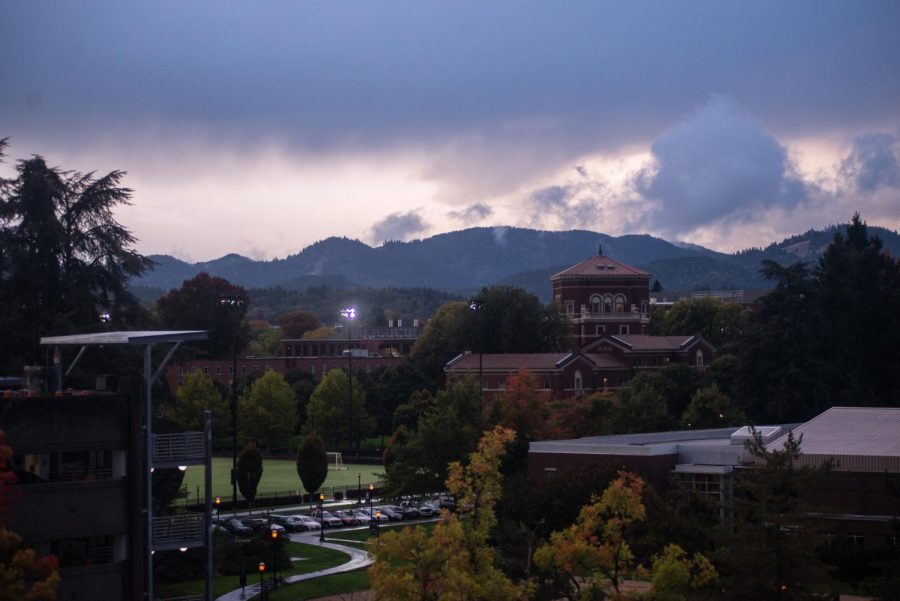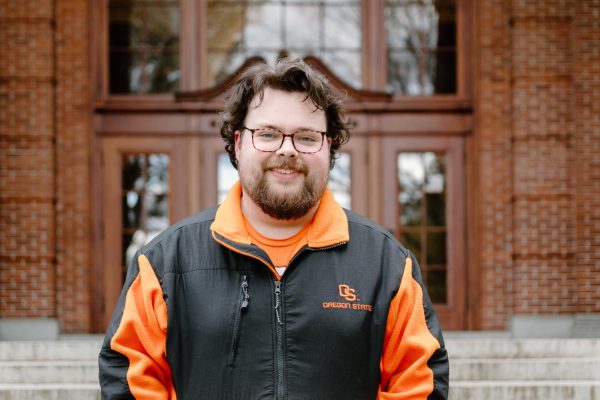Despite permanent Daylight Savings Time bill, Oregon will set clocks back an hour on Sunday
The sun rises near the ILLC and Hawley buildings on OSU’s campus. Archive, Oct. 7 2021.
November 5, 2022
As Oregonians set back their clocks at 2:00 am tomorrow , some may be wondering why they still have to do this.
Oregonians are still setting their clocks back an hour, despite Oregon’s Legislature passing a bill three years ago to move permanently to Daylight Savings Time.
Senate Bill 320 of the 2019 legislative session states that “the standard of time for the State of Oregon shall be one hour in advance of the United States standard of time.”
The bill excludes the portion of Eastern Oregon in the Mountain Time Zone.
“My constituents are tired of changing the clock twice per year,” said State Senator Kim Thatcher (R-Keizer), who sponsored the bill.
Senator Thatcher introduced a similar bill that didn’t pass in 2015, which she credits with encouraging discussion around the idea.
“It died in committee,” Thatcher said, “but it did open a conversation about what people thought of the idea.”
However, the bill cannot take effect until both Washington and California also move to permanent DST.
Washington’s state legislature approved a bill in 2019 that would move the state to permanent DST. In 2018, California voters passed a measure that would allow the California State Legislature to move the state to a permanent DST, if the federal government allowed the change.
However, according to the National Conference of State Legislatures, this change is still pending.
“Oregon’s law makes sense,” said David Bernell, an associate professor of political science at Oregon State University. “It would likely be disruptive and confusing for business, communications, travel, and other activities people engage in every day if the three west coast states were on two different time zones for part of the year.”
According to Bernell, this isn’t the first time permanent DST has been a topic of political discussion.
“Seeing it become part of the conversation again recently is not surprising,” Bernell said.
This year, part of that discussion has been generated by the Senate’s passage of the Sunshine Protection Act, a bill that would make DST permanent nationwide.
“The Senate passage of a bill moving to permanent DST was largely an unexpected fluke,” said Bernell, adding that it was “passed by ‘unanimous consent’ in just a few seconds, when few Senators even knew what was happening.”
Unanimous consent is a way of agreeing on a matter before the Senate that sets aside normal procedure to expedite proceedings.
“Under normal procedure it would have never happened,” Bernell said.
Currently, the Sunshine Protection Act has not passed Congress.
“A nationwide switch to not transitioning between times would definitely improve health,” said Andrew McHill of the Oregon Health & Science University’s Sleep, Chronobiology, and Health Laboratory.
McHill, who is an Assistant Professor in OHSU’s School of Nursing, explained that switching between times can throw our circadian system (the body’s internal clock) off.
“The switch of timing earlier by even an hour makes it…more difficult to fall asleep at night because your clock is promoting wakefulness, and…makes you more drowsy in the morning because your clock is still promoting sleep,” McHill said.
According to McHill, the drowsiness people experience during the first week of DST as their internal clocks adjust can make the week more dangerous than other times throughout the year.
“You are more likely to die during the week of Daylight Saving Time than at any other time of the year,” McHill said, “and this is particularly true for car accidents or other activities that put you at risk of falling asleep.”
According to him, switching to standard time has the opposite effect on people, as people don’t find it as difficult to fall asleep or wake up.
He also said that while permanent daylight savings time may be better than switching times, daylight savings time would still have some negative effects.
“Though we see the increase in accidents in the first week of the DST switch, these events seem to go away after about a week,” McHill said. “This is because our internal clocks have shifted and aligned to this new light/dark cycle. However, we still do get these misalignments when we stay up late on weekends and have to awaken early on Monday mornings for work and/or school.”
One consequence of these misalignments is what sleep experts call social jetlag. An article recently published in “Nutrients” describes social jetlag as “the discrepancy between biological time, determined by our internal body clock, and social times, mainly dictated by social obligations such as school or work.”
According to this article, 70% of students and workers will experience at least an hour of social jetlag daily. Beyond this, there are larger scale problems McHill is concerned about.
“People that live on the westward side of time zones, and thus get morning light later as is done during DST, make lower wages and have poorer overall health,” McHill said.
According to McHill, switching to permanent standard time, not daylight savings time, would be more beneficial for health; a view he noted was shared by both the American Academy of Sleep Medicine and the Society for Research on Biological Rhythms.
“Not switching is good, but it should really be keeping to standard time when we can get more light in the morning to better synchronize our clocks,” McHill said.


















































































![Newspaper clipping from February 25, 1970 in the Daily Barometer showing an article written by Bob Allen, past Barometer Editor. This article was written to spotlight both the student body’s lack of participation with student government at the time in conjunction with their class representatives response. [It’s important to note ASOSU was not structured identically to today’s standards, likely having a president on behalf of each class work together as one entity as opposed to one president representing all classes.]](https://dailybaro.orangemedianetwork.com/wp-content/uploads/2025/03/Screenshot-2025-03-12-1.00.42-PM-e1741811160853.png)

























